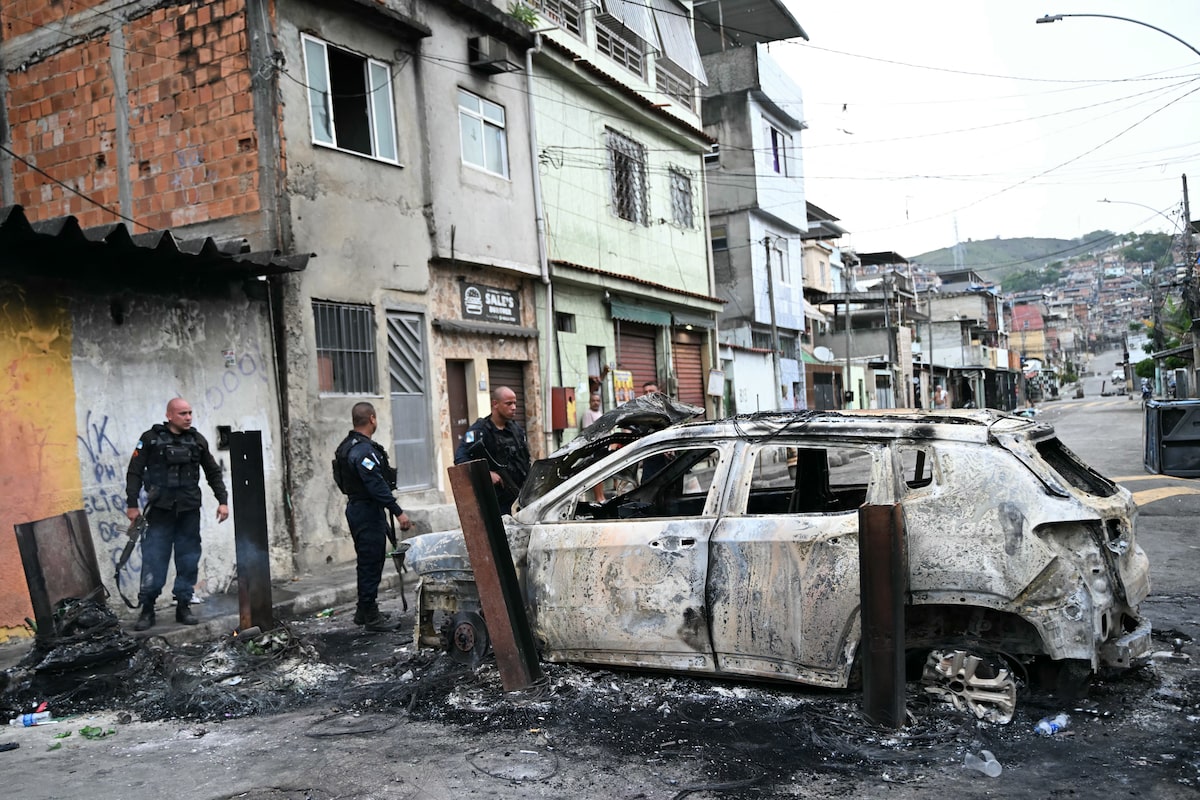Police officers escort a suspect arrested during an operation in Rio de Janeiro on Tuesday. At least 2,500 security personnel took part in the operation that led to 81 arrrests.MAURO PIMENTEL/AFP/Getty Images
About 2,500 Brazilian police and soldiers launched a massive raid on a drug-trafficking gang in Rio de Janeiro on Tuesday, arresting 81 suspects and sparking shootouts that left at least 60 suspects and four police officers dead, officials said.
The operation included officers in helicopters and armoured vehicles and targeted the notorious Red Command in the sprawling low-income favelas of Complexo de Alemao and Penha, police said.
The police operation was one of the most violent in Brazil’s recent history, with human rights organizations calling for investigations into the deaths.
Rio’s state Gov. Claudio Castro said in a video posted on X that 60 criminal suspects were “neutralized” during the massive raid that he called the biggest such operation in the city’s history. Some 81 suspects were arrested, while 93 rifles and more than half a ton of drugs were seized, the state government said, adding that those killed “resisted police action.”
Rio’s civil police said on X that four officers died in Tuesday’s operation. “The cowardly attacks by criminals against our agents will not go unpunished,” it said.
An unknown number of people were wounded.
Suspected drug dealers sit on the ground after they were detained by members of the military police special unit, during a police operation against drug trafficking at the favela do Penha, in Rio de Janeiro, Brazil October 28, 2025. REUTERS/Aline Massuca TPX IMAGES OF THE DAYAline Massuca/Reuters
The United Nations’ human rights body said it was “horrified” by the deadly police operation, called for effective investigations and reminded authorities of their obligations under international human rights law.
César Muñoz, director of Human Rights Watch in Brazil, called Tuesday’s events “a huge tragedy” and a “disaster.”
“The public prosecutor’s office must open its own investigations and clarify the circumstances of each death,” Muñoz said in a statement.
Footage on social media showed fire and smoke rising from the two favelas as gunfire rang out. The city’s Education Department said 46 schools across the two neighbourhoods were closed, and the nearby Federal University of Rio de Janeiro cancelled night classes and told people on campus to seek shelter.
Suspected gang members blocked roads in northern and southeastern Rio in response to the raid, local media reported. At least 70 buses were commandeered to be used in the blockades, causing significant damage, the city’s bus organization Rio Onibus said.
Police officers stand next to a burned car that was part of a barricade set up during the Operacao Contencao (Operation Containment) at the Vila Cruzeiro favela, in the Penha complex, in Rio de Janeiro, Brazil, on October 28, 2025. Hundreds of heavily armed Brazilian police raided slum areas of Rio in a drug raid Tuesday, touching off firefights likened to scenes from a war and leaving at least 64 people dead, Brazilian officials said. (Photo by Mauro PIMENTEL / AFP) (Photo by MAURO PIMENTEL/AFP via Getty Images)MAURO PIMENTEL/AFP/Getty Images
The operation Tuesday followed a year of investigation into the criminal group, police said.
Gov. Castro, from the conservative opposition Liberal Party, said the federal government should be providing more support to combat crime – a swipe at the administration of leftist President Luiz Inácio Lula da Silva.
Gleisi Hoffmann, the Lula administration’s liaison with the parliament, agreed that co-ordinated action was needed but pointed to a recent crackdown on money laundering as an example of the federal government’s action on organized crime.
Vice President Geraldo Alckmin and a number of ministers met in response to the operation on Tuesday afternoon. Chief of Staff Rui Costa requested an emergency meeting in Rio on Wednesday, with him in attendance as well as Justice Minister Ricardo Lewandowski.
Emerging from Rio’s prisons, the Red Command criminal gang has expanded its control in favelas in recent years.
Rio has been the scene of lethal police raids for decades. In March 2005, some 29 people were killed in Rio’s Baixada Fluminense region, while in May 2021, 28 were killed in the Jacarezinho favela.
While the Tuesday’s police operation was similar to previous ones, its scale was unprecedented, said Luis Flavio Sapori, a sociologist and public safety expert at Pontifical Catholic University of Minas Gerais.
“What’s different about today’s operation is the magnitude of the victims. These are war numbers,” he said.
At least 64 people died on Tuesday in Rio de Janeiro’s most deadly police operation ever, which targeted a major gang days before the city hosts events related to the UN climate summit known as COP30.
Reuters
He argued that these kinds of operations are inefficient because they do not tend to catch the masterminds, but rather target underlings who can later be replaced.
“It’s not enough to go in, exchange gunfire, and leave. There’s a lack of strategy in Rio de Janeiro’s public security policy,” Sapori said. “Some lower-ranking members of these factions are killed, but those individuals are quickly replaced by others.”
The Marielle Franco Institute, a non-profit founded by the slain councilwoman ’s family to continue her legacy of fighting for the rights of people living in favelas, also criticized the operation.
“This is not a public safety policy. It’s a policy of extermination, that makes the everyday life of Black and poor people a Russian roulette,” it said in a statement.

